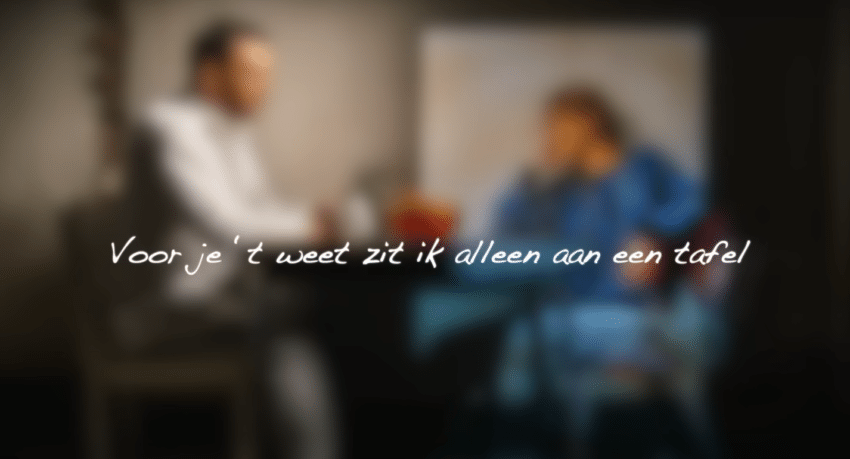Hey guys and girls. The radio is again on and i am hooked on a song i heard recently Voor Je ‘t Weet – Tino Martin & Anouk. But humming to the music somehow doesn’t cut it for me so let’s do a deep dive into the lyrics. Honestly i would like to be able to sing along and i hope i can help you do the same
Lyrics
Voor je ‘t weet zit ik alleen aan een tafel
En voor je ‘t weet kom ik steeds later thuis
Waarschijnlijk ga jij dan alleen naar je ouders
Verzin ik een smoes waarom je er weer niet bent
Over een tijd zijn wij hier aan gewend
Vocabulary:
- Voor je ‘t weet: Before you know it
- alleen: alone
- aan een tafel: at a table
- steeds later: later and later
- thuis: home
- waarschijnlijk: probably
- ouders: parents
- verzinnen: to make up
- een smoes: an excuse
- waarom: why
- er weer niet bent: not there again
- over een tijd: after a while
- gewend: used to
Key Phrases:
- “Voor je ‘t weet…” This idiom is repeated throughout the song, emphasizing how quickly things can change in a relationship. Literal meaning is “Before you know it”
- verzin ik een smoos – I make up an excuse
- “…zijn wij hier aan gewend” This phrase highlights the sad reality of becoming accustomed to a difficult situation.
Voor je ‘t weet hebben we niets in de gaten
Kom je wel thuis, maar leef je langs elkaar heen
En vraag je je af waarom we nog samen zijn
Weer alleen, voor je ‘t weet
We zijn niet meer één, ‘t is niet langer een fase
En slapen we weer alle nachten alleen
En vraag ik me af waarom we nog samen zijn
Weer alleen, voor je ‘t weet
Vocabulary:
- niets in de gaten hebben: to not notice anything
- langs elkaar heen leven: to live past each other, to grow apart
- zich afvragen: to wonder
- waarom: why
- nog: still
- samen: together
- weer: again
- één: one
- niet langer: no longer
- een fase: a phase
- slapen: to sleep
- alle nachten: every nighs
Idioms:
- “hebben we niets in de gaten” – This implies a lack of awareness or communication in the relationship.
- “leven langs elkaar heen” – A common Dutch idiom describing a relationship where two people are physically present but emotionally distant.
- “Weer alleen” – The repetition of “weer” (again) emphasizes the cyclical nature of their problems.
Hoe zou ‘t zijn, zijn we oké met de stilte?
En zie ik m’n vrienden nog vaker dan jou
En ook al zit jij dan hier nog wel naast me
Ik heb je warmte al een tijd niet gevoeld
Misschien is er toch niets meer aan te doen, oh
Vocabulary:
- hoe: how
- zou ‘t zijn: would it be
- oké: okay
- de stilte: the silence
- zien: to see
- m’n vrienden: my friends
- nog vaker dan: even more often than
- ook al: even if
- nog wel: still
- naast: next to
- de warmte: the warmth
- gevoeld: felt
- misschien: maybe
- toch: still, anyway
- niets meer aan te doen: nothing more to be done
Key Phrases and Ideas:
- “zijn we oké met de stilte?” This powerful question highlights the discomfort and lack of connection in their relationship. Silence should be comfortable between two people who are close, but here it signifies a void.
- “zie ik m’n vrienden nog vaker dan jou” This admission reveals how the singer is seeking connection elsewhere, further emphasizing the distance in the relationship.
- “Ik heb je warmte al een tijd niet gevoeld” This emotionally charged statement speaks to the lack of intimacy and affection.
- “Misschien is er toch niets meer aan te doen” A sense of resignation and helplessness emerges as the singer questions whether the relationship can be salvaged.
Voor je ‘t weet hebben we niets in de gaten
Kom je wel thuis, maar leef je langs elkaar heen
En vraag je je af waarom we nog samen zijn
Weer alleen, voor je ‘t weet
We zijn niet meer één, ‘t is niet langer een fase
En slapen we weer alle nachten alleen
En vraag ik me af waarom we nog samen zijn
Weer alleen, voor je ‘t weet
Geven we op of gaan we nu iets doen?
Want zo gaat het niet meer
Weten we nog wel hoe dit eigenlijk moet?
Of zijn we het soms verleerd?
Vocabulary:
- opgeven: to give up
- gaan we nu iets doen: are we going to do something now
- want: because
- zo: like this
- niet meer: no longer, not anymore
- weten: to know
- hoe: how
- eigenlijk: actually, really
- moeten: to have to, should
- soms: sometimes
- verleren: to unlearn, to forget how
Key Phrases and Analysis:
- “Geven we op of gaan we nu iets doen?” – Do we give up or do we do something now?
- “Want zo gaat het niet meer” –Because it doesn’t work that way anymore.
- This underlines the unsustainable nature of their current situation, demanding change.
- “Weten we nog wel hoe dit eigenlijk moet?” –Do we still know how to actually do this? – This vulnerable question reveals their uncertainty and possible loss of connection. It acknowledges that they might have forgotten how to be in a loving relationship.
- “Of zijn we het soms verleerd?” – Or have we sometimes forgotten? This final question reinforces the idea of a lost connection, suggesting that love and intimacy are skills that can be forgotten if not nurtured.
Voor je ‘t weet hebben we niets in de gaten
Kom je wel thuis, maar leef je langs elkaar heen
En vraag je je af waarom we nog samen zijn
Weer alleen, voor je ‘t weet
We zijn niet meer één, ‘t is niet langer een fase
En slapen we weer alle nachten alleen
En vraag ik me af waarom we nog samen zijn
Weer alleen, voor je ‘t weet
Vraag je je af waarom we nog samen zijn
Weer alleen, voor je ‘t weet
“Voor je ‘t weet” is more than just a catchy song – it’s a window into the complexities of love and relationships, all while offering a fun way to learn Dutch. By dissecting the lyrics, we’ve uncovered rich vocabulary, common idioms, and grammatical structures that bring the language to life. So, next time you’re looking for an engaging way to improve your Dutch, why not turn up the music and let Tino Martin be your guide? You might be surprised by how much you learn “voor je ‘t weet”!
And for those of you who still like to do some exercises to be sure to remember it all here are some dialogue cards. Read the word or expression, hear it pronounced in dutch and try to guess the meaning, then turn the card. Have fun!

